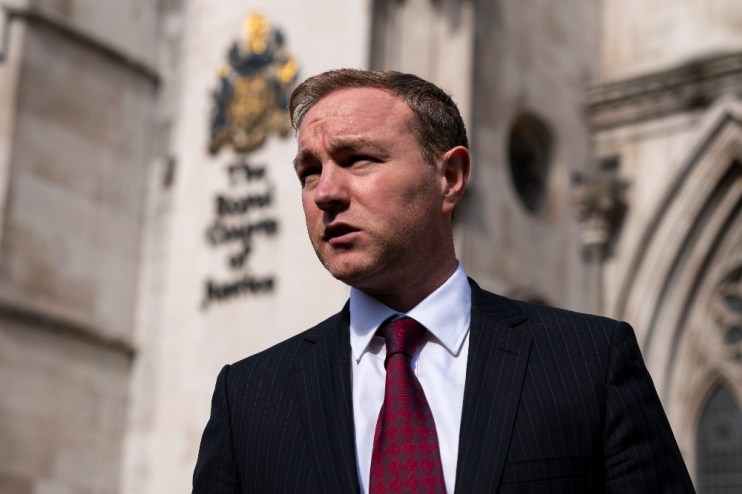Tom Hayes: Court upholds Libor conviction as top MP warns London now an ‘outlier’

The Court of Appeal has upheld the conviction of former Libor trader Tom Hayes today after he spent years in prison for rate-rigging – with one MP saying the decision made the capital an “outlier” compared to other financial capitals.
On Wednesday, Lord Justice Bean read out a press summary at the Court of Appeal, dismissing the appeals from Tom Hayes and Carlo Palombo, who sought to overturn their criminal conviction.
Both men have 14 days to submit applications for the point of law of general public importance to be certified and for permission to appeal to the Supreme Court.
Former UBS and Citigroup trader Tom Hayes (45) was sentenced in 2015 to 11 years in prison after he was found guilty of conspiring to rig the London Interbank Offered Rate, known as Libor. He was the first person convicted in Britain of rigging the now-discredited financial benchmark.
He was also charged in the US, but he had that long-running case against him thrown out by a New York judge back in 2022. He was released from prison in the UK, on licence, in January 2021 having spent five-and-a-half years in prison.
Today’s ruling led David Davis MP to warn that the capital was out of line with other jurisdictions in how it regulates inter-bank rates.
“This ruling means that the LIBOR and EURIBOR regime work under different laws from everywhere else in the world. London is now an outlier, different from New York, Tokyo, Hong Kong, and Europe,” he tweeted.
“A decision of this significance, both for the status of the City of London and for natural justice, needs to be resolved by the highest court in the land, so it is vital that the judges allow it to go to the Supreme Court.”
While Palombo (44), a former trader at Barclays, was convicted of rigging the Euro Interbank Offered Rate, known as Euribor. He was sentenced to four years in prison back in 2019 and ordered to pay prosecution costs of £725,000.
Hayes and Palombo have long been campaigning to have their names cleared.
Hayes and Palombo had their cases, which were investigated and prosecuted by the Serious Fraud Office (SFO), referred to the Court of Appeal following reviews by the Criminal Case Review Commission (CCRC).
The trial was heard in front of Lord Justice Bean, Lord Justice Popplewell and Mr Justice Bryan over three days last month.
Hayes’ appeal argued that the directions given to the jury in his trial were wrong in law, which resulted in a trial that was “wholly unfair, and convictions which are unsafe.”
His lawyers also argued that court should consider the US decision to throw out his case, where the US court held that “a bank’s submission of a Libor rate did not implicitly represent that there had been no consideration of the panel bank’s existing trades”.
Palombo’s appeal relied solely on this US court decision, which is known as USA v Connolly and Black.
However, today, the court found that all of their arguments had failed, which resulted in a dismissal.
Speaking outside the Royal Courts of Justice, Hayes said that once that has the opportunity to make sufficient points certified in order to take it to the Supreme Court, “we will do that”. He did add that they have “tried four times previously to get it heard at the Supreme Court.”
He told the huddle of the press that the “UK remains an international outlier in relation to the definition operation of Libor, not only with America but also with Europe.” He asked” “the question is in international financial markets, can we allow such a discrepancy to continue?
He stated that he felt that his team made very strong arguments at the hearing, he noted that “frankly it’s shocking that the decision came back the way it came back.”
Hayes pointed out that they have argued their point four times, and every time they have been stopped from going higher. He stresses that “frankly, surely this time it’s a time for it to be heard at the highest level.”
“All I can hope is that they allow us to have that opportunity at the very least, because it’s not consistent with French law, German law, American law. It’s a very sort of Alice in Wonderland situation here,” he pointed out.
“I’m resigned because I’m used to losing. I lost my appeal before my trial. I lost my appeal after
my conviction. I lost my trial itself. So one thing I’m going to say, to paraphrase various other people, I’m a
fighter, not a quitter, as are my legal team and as are the other traders involved here,” he stressed.
Hayes answered a question on if he felt like a scapregoat, to which he replied he was “definitely a scapegoat” at that point in time [nine years ago]. He added that the “egregious sentence destroyed my life in pretty much every regard.”
Commenting on the decision, a Serious Fraud Office spokesperson said: “The Court of Appeal’s judgment is clear that these convictions for fraud are still as relevant today as ten years ago. No one is above the law and the court has recognised that these convictions stand firm.”